unit5 Meeting your ancestors
文档属性
| 名称 | unit5 Meeting your ancestors |
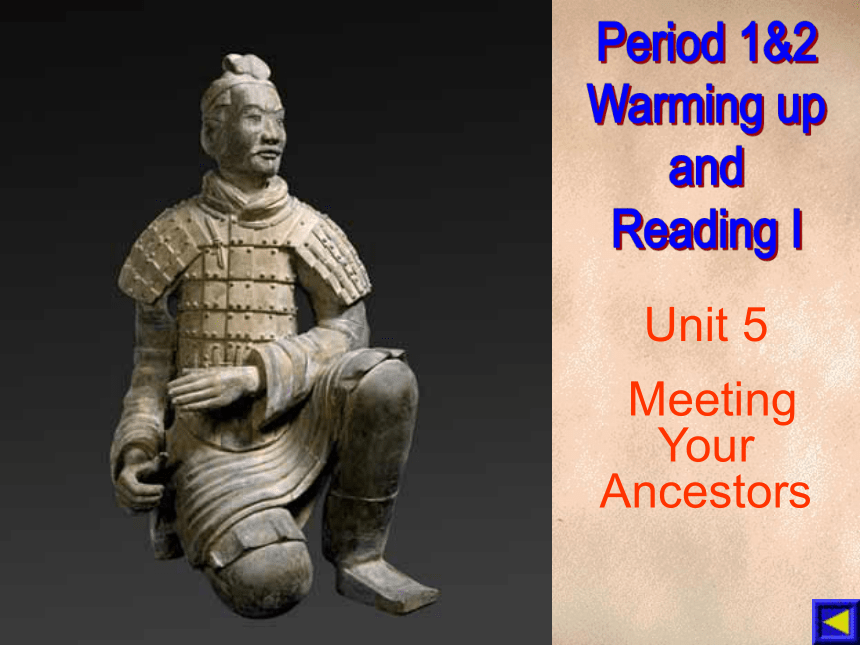
|
|
| 格式 | rar | ||
| 文件大小 | 8.8MB | ||
| 资源类型 | 教案 | ||
| 版本资源 | 人教版(新课程标准) | ||
| 科目 | 英语 | ||
| 更新时间 | 2008-05-19 00:00:00 | ||
图片预览

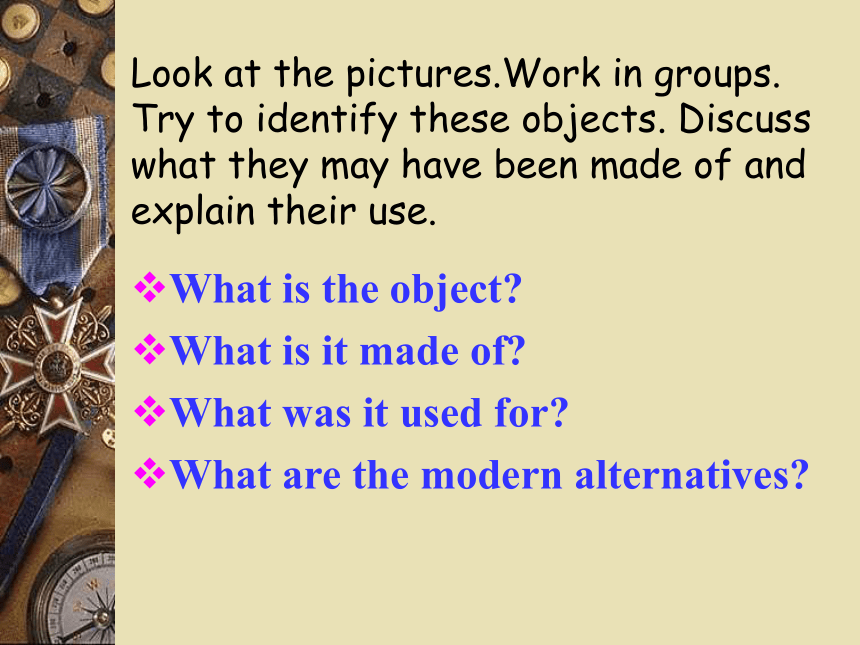
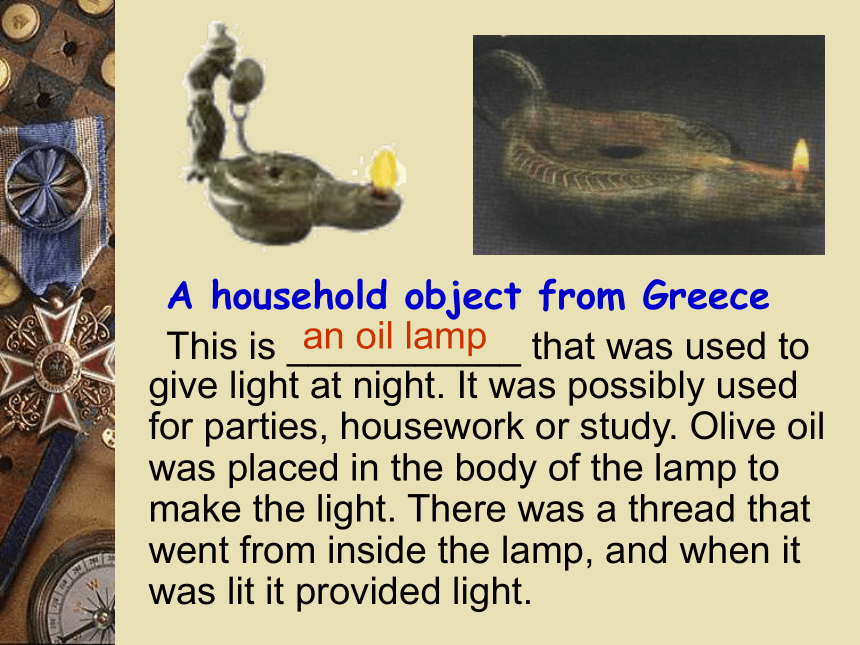
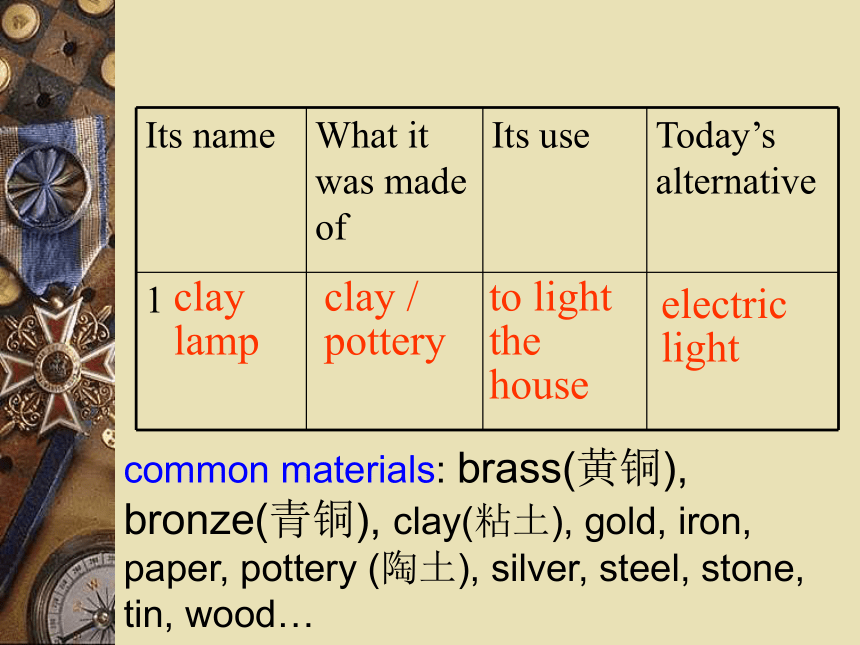
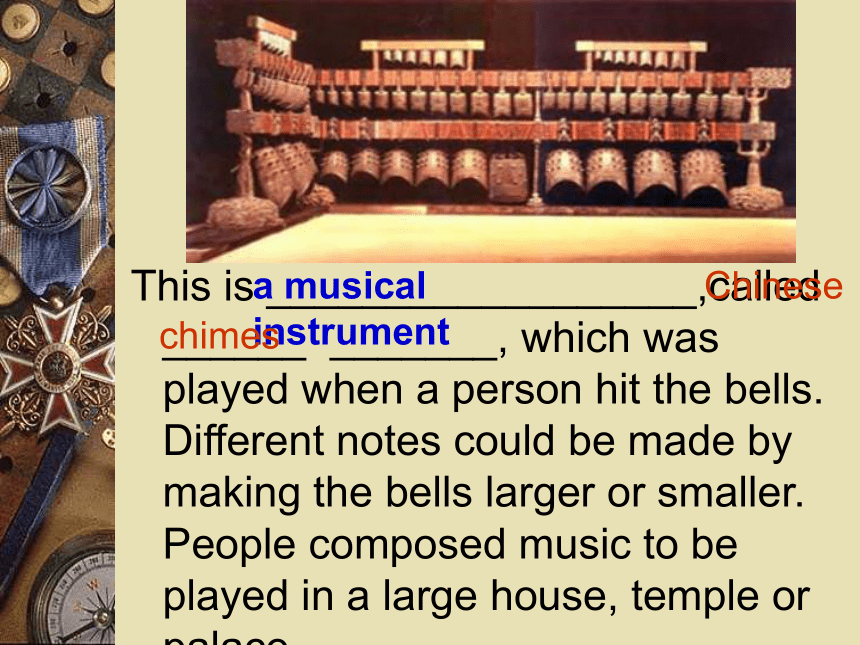
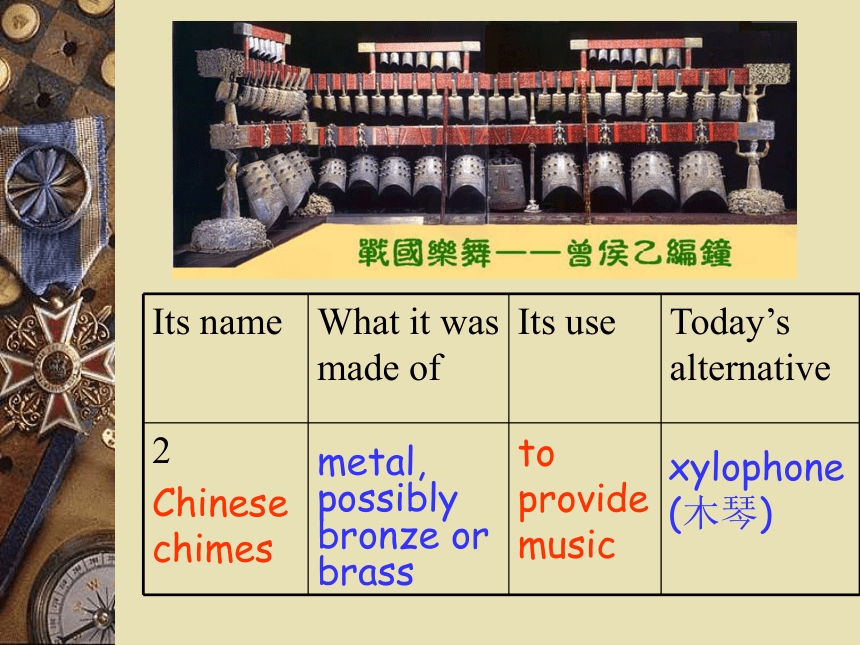
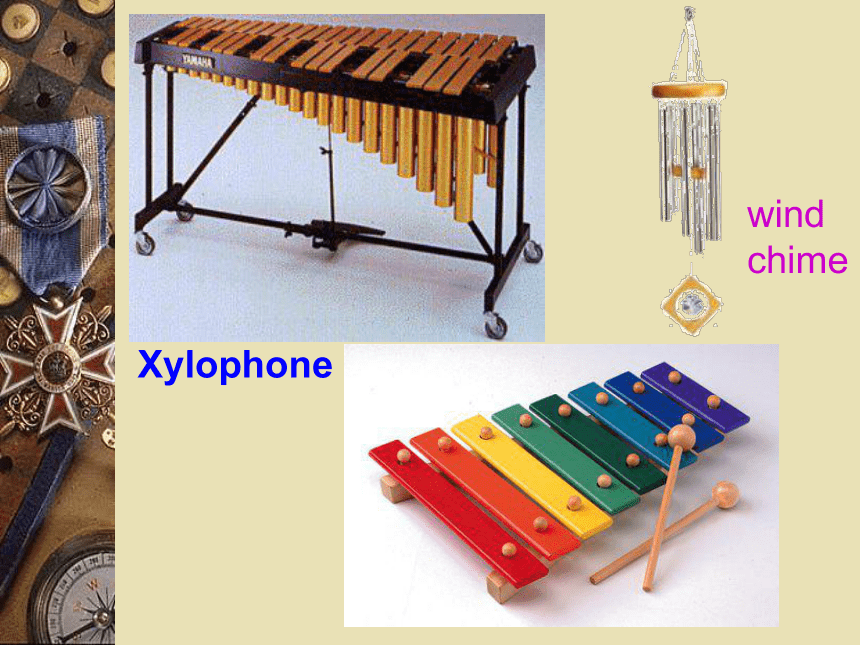
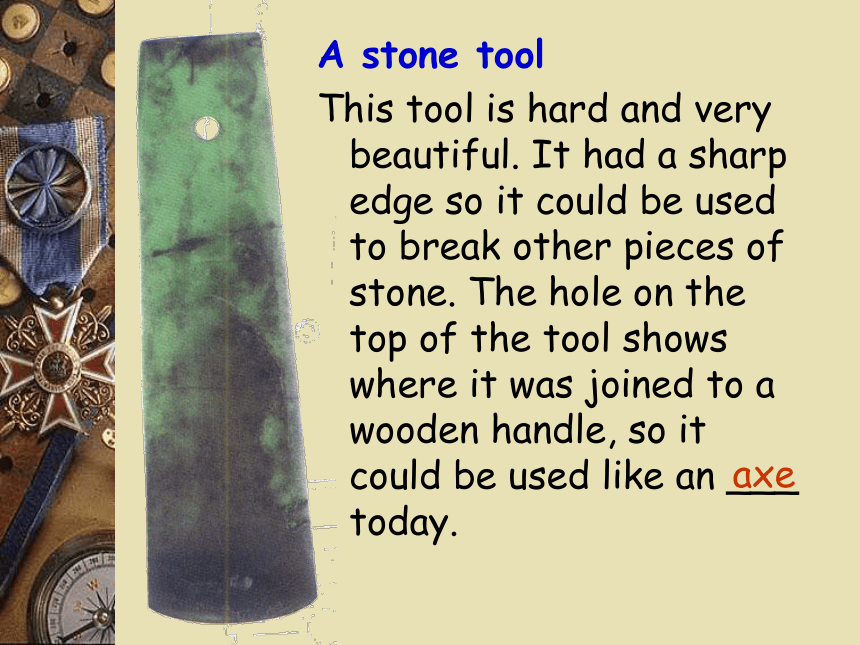
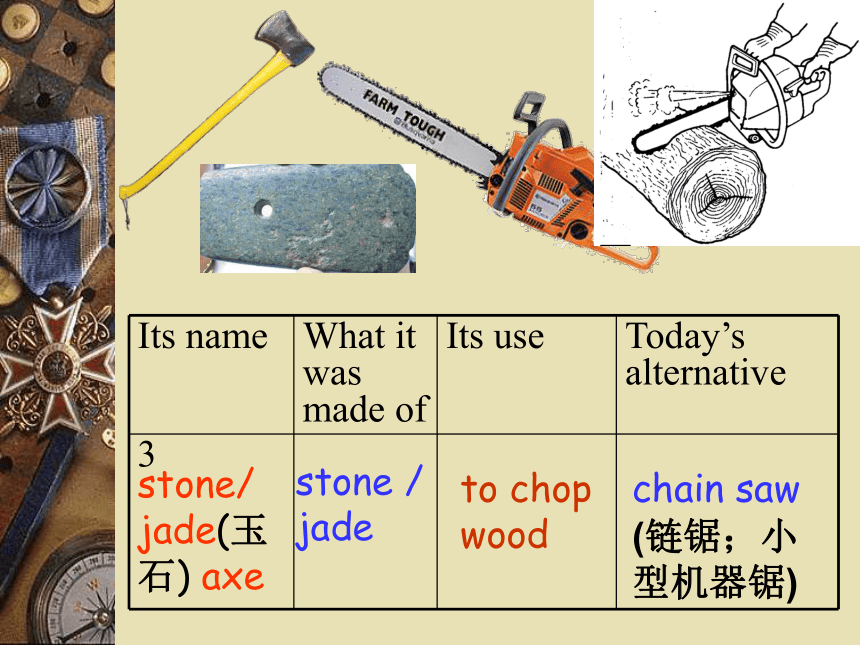
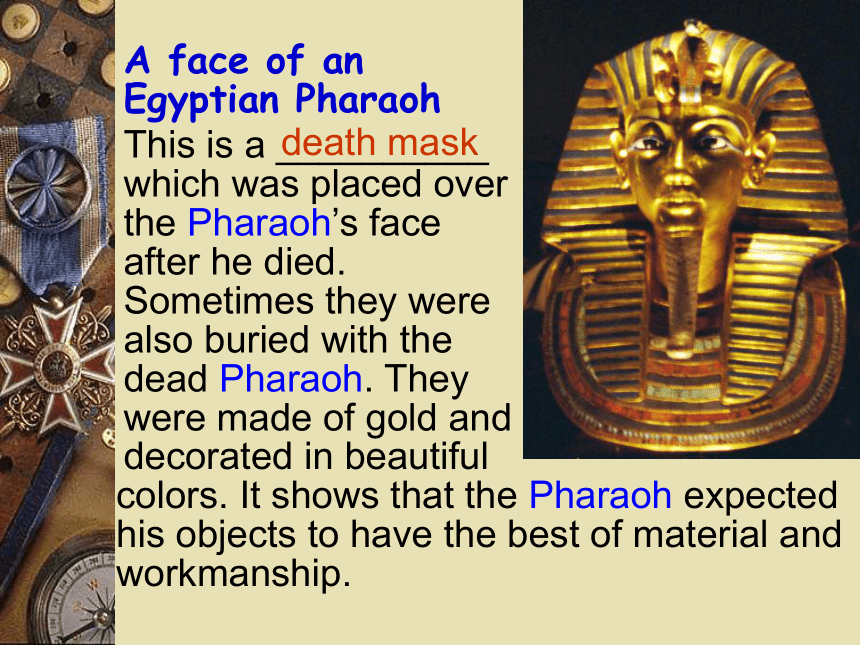
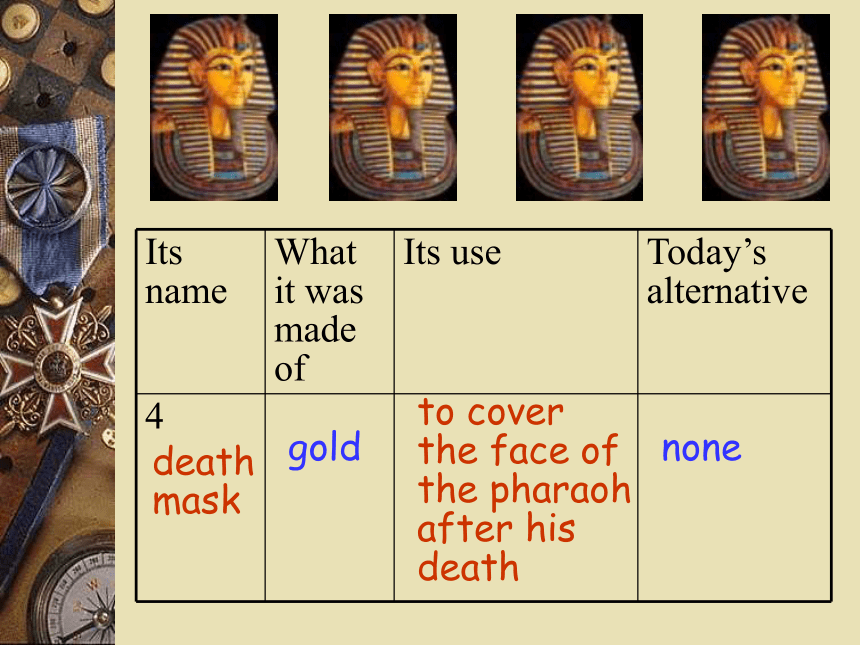
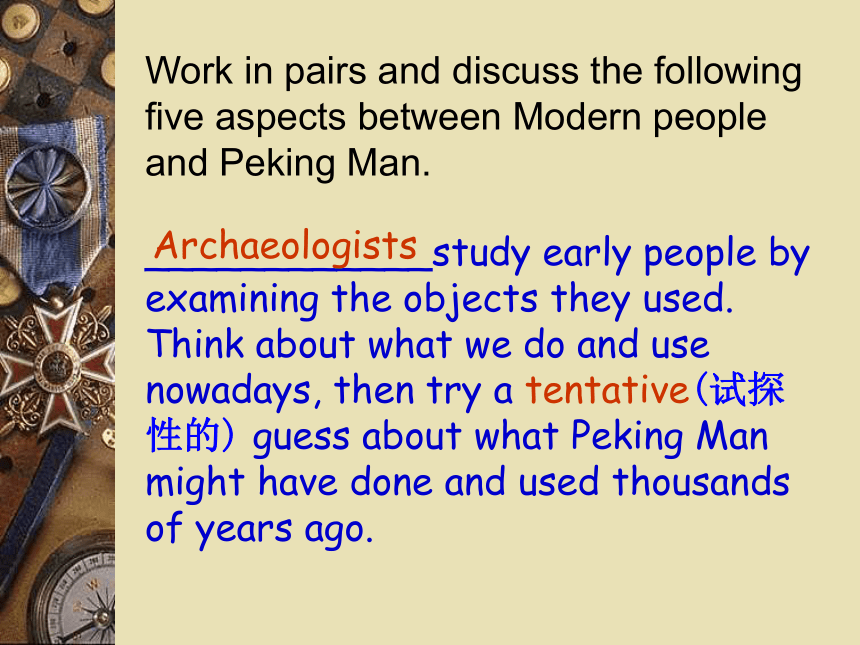
文档简介
课件104张PPT。Period 1&2
Warming up
and
Reading IUnit 5
Meeting Your Ancestors What is the object?
What is it made of?
What was it used for?
What are the modern alternatives?Look at the pictures.Work in groups. Try to identify these objects. Discuss what they may have been made of and explain their use. A household object from Greece
This is ___________ that was used to give light at night. It was possibly used for parties, housework or study. Olive oil was placed in the body of the lamp to make the light. There was a thread that went from inside the lamp, and when it was lit it provided light.an oil lampclay lampclay / potteryto light the houseelectric lightcommon materials: brass(黄铜), bronze(青铜), clay(粘土), gold, iron, paper, pottery (陶土), silver, steel, stone, tin, wood… This is __________________,called ______ _______, which was played when a person hit the bells. Different notes could be made by making the bells larger or smaller. People composed music to be played in a large house, temple or palace.a musical instrumentChinesechimesChinese chimesmetal, possibly bronze or brassto provide musicxylophone(木琴)Xylophonewind chimeThis tool is hard and very beautiful. It had a sharp edge so it could be used to break other pieces of stone. The hole on the top of the tool shows where it was joined to a wooden handle, so it could be used like an ___ today.A stone toolaxestone/ jade(玉石) axestone / jade
to chop wood
chain saw(链锯;小型机器锯)A face of an Egyptian Pharaoh
This is a __________ which was placed over the Pharaoh’s face after he died. Sometimes they were also buried with the dead Pharaoh. They were made of gold and decorated in beautifuldeath maskcolors. It shows that the Pharaoh expected his objects to have the best of material and workmanship.death maskgoldto cover the face of the pharaoh after his death none____________study early people by examining the objects they used. Think about what we do and use nowadays, then try a tentative(试探性的) guess about what Peking Man might have done and used thousands of years ago.Work in pairs and discuss the following five aspects between Modern people and Peking Man.
Archaeologistsstone, wooden or brick housecavewooden, special for each rooma fireplaceTV, sport, films, job hobbies, education, meals togetherfruit, vegetables, meat and fish, etcmeat, fish, berries and fruit in seasonnatural and man-made fibresskins, leavesWord study in warming-up and pre-reading§identify
1.Try to identify these objects.鉴别一下这些物品。
2.I identified the jacket at once; it was my brother's. 我立即认出了那件外套,它是我兄弟的。
3.Can you identify your umbrella among this lot? 在这么多伞中你能认出你那一把吗?
4.She identified the man as her attacker. 她认出那个人即是动手袭击她的家伙。v. (pt, pp -fied)=recognize 认出★ID card =identification card
身份证§ Can you think of the alternatives we could use today?
1) adj.--(of two things) that may be had, used, etc. in place of sth. else; other
2) n.--choice between two things
a) There are alternative answers to this problem.
这个问题有两个可能的答案。(adj.)
b) The way was blocked, so we went by an alternative road.
这条路被挡住了,因此我们走了另一条路。(adj.)c) Is there no alternative to what you propose?
你的提议没有变通的余地吗?
d) We have no alternative but to go on.
除了继续下去,我们没有选择的余地。
e)We could take the train or alternatively go by car.
我们可以乘火车去,也可以乘小车去。
1.It’s a household object from Ancient Greece.
2.The whole household was / were up early. 全家人都起得很早。
3.I grew up as part of a large household.我是在一个大家庭长大的。
4.How many people are there in your household? (=family)
§household:
1)n. =all the people living in a house.全家人
2)adj. =used in a household; commonly known, familiar
★household appliances 家用电器
★a household name 家喻户晓的名字
1.Try a tentative guess about what Peking Man might have done and used thousands of years ago.
2.make a tentative suggestion / plan / proposal 提出试验性的建议(提议,计划)
§(in)accurate → (in)accuracy
(in)correct → (in)correctness
★Is this watch accurate?
这只表准吗?
★There is a slight inaccuracy in this design.
这张设计图中有一点不大准确。How did the early people keep warm?
What animals were their most dangerous enemies?
How did they make clothes?Listen to the text carefully and answer the following questions. How did the early people keep warm?
What animals were their most dangerous enemies?
They constructed _____at the ________ in the center of the caves to keep them warm. They might have kept fires burning all_____. They might have hung ___________ at the cave ______to keep out the cold.______ and ______ were their most dangerous enemies.firesfireplaceswinteranimal skinsmouthTigersbearsHow did they make clothes?
Their cloths were made from___________. They used _________stone tools to cut up the animals and ________ their skin. Then smaller s______ were used to clean the fat and meat from them. They had to ___an ample(=more than enough) amount of salt inside the skin to make it soft enough. Finally, they would have cut it and s____ the pieces together with needles made of animal_______.animal skinssharpenedcrapersremoverubewnbonesEx3. Stage 1: Life in the _____
Stage 2: What we can learn from
a ______
Stage 3: What we can learn from
a _________Dress: animal skins ____together with needles and thread, necklacesTools: s______, ___-heads, bone________caveneedlenecklacecrapersaxeneedlessewnComprehending (P39)
Ex 2.
Homes:_____, perhaps with skins to keep out the coldcavesappearancebonesfish bones.seashellstradedcaughtshallowRead stage 2 and 3 carefully and find out the information about needle and necklace. Then make your own guess of what can be discovered from it.clothes ToolscleanskinsSummary
First the ____________ describes how early people live in their______. Then she examined what we can learn from a_______. Last of all she discovered what we can learn from a_______.
archaeologistcavesneedlenecklaceLanguage Points Being polite:
You must be aware that…
I’m sorry to interrupt you but.. Ways to explain things:
We think it is reasonable to assume…
We think they might…
We have been excavating… We have been finding…
It seems…
Our evidence suggests…
As the botanical analyses have been specially showing us…
Perhaps…Useful sentence patternWord study in Reading
§archaeology n.考古学
archaeologist n.考古学家
archaeological adj.考古学的, 考古学上的
§show sb around 领着…四处参观
§You must be aware (=know) that it’s here that we’ve found evidence of some of the earliest people who lived in this part of the world.
§aware: adj.=having knowledge or realization n. awareness
*aware + of + n./prom
*aware + that-clause
a) 你可知道你坐在我的帽子上吗?
____________ that you are sitting on my hat?
b)我们十分明白情势的严重性。
We _______________ the gravity of the situation.
c)我不知道他对他母亲的去世如何伤感。
I _______________ how deeply he had felt the death of his mother.Are you aware are fully aware ofwas not aware (of)1.We have been excavating here for many years. (Line 6)
2.We have been excavating layers of ash almost six meters thick. (Line 15)
§excavate: v.①=To make a hole in开凿 ②=to expose or uncover by digging考古发掘
★The workmen excavated a hole in the wall to let the sewage pipe pass through.
工人们在墙上掘了个洞让排污管道通过。★excavate an archaeological site
挖掘考古现场
★excavate a buried city
发掘一个埋在地下的城市
★excavation:n.[U]挖掘,发掘[C]挖掘成的洞,出土文物
★excavator:挖掘者,挖掘机§ I’m sorry to interrupt you but …
*I’m sorry … but …是用来向别人礼貌地解释情况的一种表达方式。
很抱歉,但我有很重要的事情要说。
I’m sorry but I have something important to say.
interrupt: vt. & vi.
1)=to break the continuity of 使中断
2)=to break in upon ( a person speaking or doing sth, his speech,etc.) 打断; 插嘴
a) 在我忙的时候不要打扰我。
Don’t interrupt ( me ) while I’m busy.
b)交通被洪水阻断。
Traffic was interrupted by floods.
c)下雨中断了我们的捧球比赛。
The rain interrupted our baseball game.
d)打断别人的话,是不礼貌的。
It is rude to interrupt.§We have found human and animal bones in those caves higher up the hill as well as tools and ornaments.
★ornament: n. ①[U] (fml)=decoration装饰;②[C]=thing designed to add beauty to sth, but usu without practical use (通常没实用价值的)装饰品
1)The palace was rich in ornament.这个宫殿装饰得富丽堂皇。
2)The shelf was crowded with ornaments. 这个架子摆满了装饰品。
★ornament: v.=decorate
Her dress was ornamented with lace. 她的裙子饰有花边。§We think it is reasonable to assume they lived in these caves, regardless of the cold.
★assume: v.1)=accept (sth) as true before there is proof 假定,设想 2)=take on, undertake 担任,承担
*assume + n.
*assume + n. + (to be … )
*assume + that-clause
a) We must assume his innocence/him to be innocent / that he is innocent before he is proved guilty. 在证实他有罪前,我们必须假定他是无罪的。b)他并非你所以为的那样愚蠢。
He is not such a fool as you assumed him to be. (→supposed)
c) 每个人都被认为知道这些规则。
Everyone ___________________ to know the rules.
d)假定这条消息是真的,你会感到惊讶吗?
___________ that the news is true, will you feel surprised?
is assumed /supposedAssuming→ Assuming the news to be true, will you feel surprised?
e) assume office 就职★regardless of:prep.1)=in spite of不管; 2)=paying no attention to不顾
a)We will continue regardless of past failures.尽管以前我们失败过,但仍要坚持下去。
b)regardless of the consequences / danger / expense / one’s feelings
不顾后果(危险,费用,某人的感情)
★ We think it is reasonable to assume they lived in these caves, regardless of the cold.
我们有理由认为他们不顾严寒,就住在这些洞穴里。§at (the) most → at (the) least
§1.They didn’t have material like(=as) we have today. (P38)
2.Did early people really care about their appearance like (=as) we do? (P39)
3.她烹饪的技术不如她的母亲。
She can’t cook like/as her mother does.
They(=animal skins) would be so heavy to cut and sew together.
sew→sewed→sewed/sewn 缝纫
saw →sawed→sawed/sawn 锯开
a sewing machine 缝纫机
It seems that they might have used sharpened stone tools to cut up the animals and remove their skin.
sharpen a pencil / knife 削铅笔/磨刀
a pencil-sharpener 铅笔刀
a knife-sharpener 磨刀石
blacken/deepen /strengthen/lengthen/widen /heighten
cut up:=to cut something into smaller pieces
cut down the tree → cut up the (fire)wood1)洪水切断了我们的供应. The floods have _______ our supplies.
2)我们正忙于砍树. We are busy ______ _____ the trees.
3)我们把树上所有的枯枝都砍去了. We _________ all the dead wood from the tree.
4)裁缝在裁剪衣服之前仔细检查了这块布.
The tailor carefully examined the cloth before starting to _______ a garment. cut off cuttingdown cut awaycut out★ Complete the sentences with the proper
expressions: cut away/cut down/cut off/cut out§Then smaller scrapers might have been used to clean the fat and meat from them.
★scrape: v.=make (a surface, etc) clean or smooth by drawing a sharp tool or sth rough across it
1)scrape the wallpaper off before painting the wall 在墙上涂油漆前把壁纸刮掉
2)I scraped my knee on the sidewalk. 我的膝盖在人行道上刮破了。
3)Scrape the mud off your shoes with this knife.用这把小刀把你鞋上的土刮去。
4)scraper:刮刀,擦具, 铲土机§They would have had to rub an ample amount of salt inside the skin to make it soft enough.
★ample:adj.=more than enough, plenty of, abundant, large in size
1) He has ample resources.
→He is wealthy.
2) $5 will be ample for my needs.
→$5 will be enough for my needs.
3) We have ample time to get to the station.我们有充足的时间到车站。
4) an ample salary 优厚的薪金
5)车内的空间足以容纳你们所有人. There’s _____________ room for all of you in the car.
ample/enough§It’s a primitive necklace.
这是条原始的项链。
1)primitive societies / tribes 原始社会/部落
2)Primitive man lived in caves.
原始人住在山洞里。
3)Primitive man made tools from sharp stones and animal bones. 原始人用尖石块和动物的骨制造工具。
4)The natives of that region still live in primitive straw huts. 那个地区的居民依然住在古老的茅草屋里。
5)Small seashells were once used as a primitive kind of money. 小贝壳曾经被用作简单的钱币。★primitive: adj.
1) [usu attrib] =of or at an early stage of social development
2)=simple,as if from an earlier period of history
§ It is so well preserved.
★ preserve: 1)v.
a)=keep from harm or danger 保护; 防护
b)=keep from decay, risk of going bad, etc. 保藏; 贮存
c)=to prepare (food) for future use, as by canning or salting 腌制食物
2)n. a)[C usu pl]果脯,蜜饯
b)[U] 果酱: strawberry p~1.preserve fruit / eggs 保存水果/蛋
2.preserve one’s eyesight 保护视力
3.a well-preserved old man
→one who shows few signs of the usual weakness of old age
保养得好的老人
4. They spent a lot of money to preserve the old castle and other places of historic interest. 他们花了不少钱来维修那座古城堡和其它古迹。
5.You can preserve meat or fish in salt.
你可以用盐保存肉或鱼。
6. preserve peace/public order
维持和平 / 公共秩序§Some of the beads are made of animal bones but some are made of shells.
★bead: a small, often round piece of material, such as glass, plastic, or wood, that is pierced for threading.
珠子,小而圆的材料(如玻璃,塑料,木材),其上有孔可穿在线上
eg She wore a string of beads round her
neck. 她脖子上挂了一串珠子。
★beads:a necklace made of such pieces.
(以这种珠子穿成的)项链,念珠
★beads of sweat 汗珠abacus:The abacus was a great invention in ancient China and has been called by some Western writers "the earliest calculating machine in the world."Abacuses are easy to make, handy to carry around and quick to give the answers, provided one knows how to move the beads.
★botany: n.1)=the science or study of plants 植物学 2)=the plant life of a particular area 植物或植物群,特定地区的植物
★botanical: adj.1)=of or relating to plants or plant life 植物的,与植物有关的 2)=of or relating to the science of botany植物学的,与植物学有关的
n.=a drug, medicine, or similar substance obtained from a plant or plants植物制剂,取自植物的药品、药物制剂或类似物
◎a botanical garden 植物园
★botanist: n. 植物学家★analysis:n.[U, C pl - ses]
◎chemical analysis 化学分析
◎an analysis of the milk 对牛奶的分析
◎The analysis of the samples on the murder spot showed some valuable clues to the police.对谋杀现场标本的分析为警察提供了一些有价值的线索。
◎analysis of sales figures
对销售数额的分析
◎a detailed analysis of the situation
详细的形势分析报告 ★specific: adj.精确的,特定的 n.精确的细节
1)What are your specific aims?你的确切目标是什么?
2)The money is to be used for a specific purpose. 这钱将用于某特定用途。
3) I want a specific answer. 我想要一个明确的回答。
4)You were specifically warned by your doctor not to eat fish.医生曾特别警告你不能吃鱼。
5)The houses are specifically designed for old people.这些住宅是特地为老年人设计的。§As the botanical analyses have been specifically showing us, all the fields around here used to be part of a large shallow lake.
植物学的分析结果明确告诉我们,这儿四周曾经是个很大的浅水湖。
§毫无疑问,当时湖里是有鱼的。
_______________________________ there were fish swimming in the lake.
Undoubtedly / There is no doubt that★herd: n.
1)=a group of cattle or other domestic animals of a single kind kept together for a specific purpose 牧群,为了某种特定目的而养在一起的牛群或其他同种家养动物群
2)=a number of wild animals of one species that remain together as a group兽群
eg a herd of elephants 一群大象
3)=a large number of people; a crowd 许多人,一群人:
eg a herd of stranded passengers.
一群处于困境的旅客★category: n.class or group of things ina complete system of grouping 类,群
◎There are different categories of books in a library. 图书馆里有各种不同种类的书籍。
◎place things in categories
把东西分门别类进行整理
★significance:重要; 意义;价值
◎What is the significance of this speech?
这个讲话有什么意义?
◎The significance for college students of doing a part-time job means more than money and experience. 大学生打工的意义还不仅在于钱和经验。
★somehow / someway: adv.
1)=in some way, by some means设法
2)=for a reason that is unknown 不知何故,反正
◎I must finish this work somehow.我必须设法完成这工作。
◎Somehow, I don’t feel I can trust him.反正,我觉得不能信任他。
◎Somehow I don’t like him. 不知何故,我不喜欢他。
◎Somehow he made a terrible mistake.不知何故,他犯了个大错误。★systematic: adj.有系统的,有计划的; 有预谋的,故意的
◎He’s very systematic in all he does.他做一切事情都有条不紊。
◎systematic learning of English英语的系统学习
◎systematic research有系统的研究
◎systematic liar 故意说谎者
Answer keys
P40-Ex.1
1.techniques
2.identify
3.aware
4.ample
5.reasonable
6.primitive
7.sharpened
8.miles
9.assumed
10.entirelyP40-Ex.2
1.thought highly of
2.regardless of
3.In spite of
4. thinks of
5. thought little ofP 41
Ex.3
4
5
3
1
6
2
P41-Ex.2
1. How long have you been learning to fly an airplane, Sam?
2. How long have you been swimming?
3. What have you been doing/up to, Sally and Zhou Xin?
4. What have you been arguing about for years?
5. Jiao Yang, what kind of washing powder have you been using to make your clothes so clean and soft?(L13 )…have been excavating…
(L17) …have been finding…
(P39) …have been specifically showing us,…
现在完成进行时 (参考P94)
1) –Hi, Tracy, you look tired.
--I am tired. I ____ the living
room all day.
A. painted B. had painted
C. have been painting D. have painted
C2) Now that she is out of a job, Lucy ____ going back to school, but
she hasn’t decided yet.
A. had considered
B. has been considering
C. considered
D. has consideredB3) They ___ on the program for almost one week before I joined them, and now we ___ on it as no good results have come out so far.
A. had been working; are still working
B. had worked; were still working
C. have been working; have worked
D. have worked; are still workingA4)我的字典丢了,我一直在找,但还没找到。
My dictionary _____________, I ________________ it, but I still _______________ it.
is lost/missinghave been looking forhaven’t found(L3,P38) … must be aware …
(L10, P38) … must have been …
(L14,P38) … might have hung …
(L12, P38) … would have kept …
表示推测的句型:
肯定句
must/may/might /could + be …(推测现在)
must/may/might/could + have +p.p (推测过去)否定句
can’t (couldn’t) + be …/ + have + p. p.
“不可能… ”
may (might ) not /+ be /+ have + p. p.
“可能不 …”
疑问句
can (could) + be / + have + p. p. 情态动词的其他用法:
表示对过去相反的情况
should /ought to + have done
shouldn’t /oughtn’t to + have done
needn’t + have done
could + have done
might + have done
Using Language The Feast:
18,000 BCReading and Speaking (P43)
Answer key for Exercise 1:
DAHU: catch____, repair_________,
make s______ and ________
LALA: collect f___ and____, prepare
_____fishstone toolscrapers axe-headsruitnutsfoodAnswer key for Exercise 2: (P44)
Men’s tasks
1. Making and repairing_____
2. Fishing
3. Cutting down_____
4. ________animals
5. Protecting the group from_____toolstreesHuntingharmWomen’s tasks
1. Collecting____, f___ and w___
2. ________ meat and fish for cooking
3. Preparing ____to make clothes
4. Preparing food
5. Looking after_______nutsruitaterCutting upskinschildrenLanguage Points
For Reading II§_______ is a large and well prepared meal, usually for many persons and often accompanied by entertainment.(n.)
A feast盛宴,筵席(通常有很多人参加,并有娱乐活动)
◎拉拉担心她这次盛宴的准备工作,所以赶紧把坚果和水果收集起来就快步回家了。
Worried about the ___________ for her feast, Lala quickly turned for home with her _________ of nuts and fruit.preparationscollection◎We feasted on chicken and coconuts.
我们吃鸡肉和椰子,大饱口福。(v.)
◎Our reporter feasted his eyes on the beautiful scene of Venice. (喻)
我们的记者大饱眼福,饱览了威尼斯美丽的景色。(v.)
§ ___________ means to express approval, especially by clapping the hands.To applaud 赞许,尤指鼓掌赞许
◎ 当族人为他的选择欢呼鼓掌的时候,拉拉觉得非常自豪。She had felt so proud as the group shouted loudly to _________ his choice.applaud◎演唱会结束时,大家都(对他/对他的表演)热烈鼓掌。 Everyone __________ (him / his performance) at the end of the concert.applauded◎ I applaud your decision.(=approve of赞成)我赞成你的决定。§ If only she had looked ahead and planned better! 要是她早有预见,计划得更好些就好了!
if only “要是,但愿”,相当于“How I wish”,往往引起虚拟语气,用感叹句。用一般过去时表示对现在的虚拟(a),用过去完成时表示对过去的虚拟(b)。
if only + S + did…(a) / had done…(b)
◎要是我能飞就好了!If only I could fly!
◎要是我早点知道就好了。If only I had known it earlier.★look ahead:think about what is going to happen in the future计划未来, 预测未来
◎你是否想过五年后你要做些什么?
____________________ to what you’ll be doing in five years’ time?Have you looked ahead◎Everyone should look ahead and save a little money each year for when he retires.accelerate: v.(make sth) move faster or happen earlier; increase the speed of
(使)加速,加快
acceleration: n.
accelerator: n. 加速器
◎赛跑运动员在转弯处顺势加速。The runners accelerated smoothly around the bend.
◎那辆车加速超过了我。The car accelerated to overtake me.★lie in wait (for)埋伏以待(等候袭击)
◎猫躲在那儿等着鸟飞下来。The cat lay in wait for the bird to fly down.
◎The robbers were lying in wait for the rich travelers.
◎The bright colors of the flowers arrested the boy’s attention.
花卉的鲜艳颜色引起了小孩的注意。(a=catch/attract one’s attention 吸引/引起注意)
◎Poor food arrests the natural growth of children.
粗劣食物妨碍儿童的自然成长。
(=put a stop to a process or movement 阻止,妨碍)
◎She had almost reached her destination when a delicious smell arrested her progress and she stopped.
她快到目的地的时候,一阵香气扑鼻而来,使得她驻足不前。★ arrest: vt. 逮捕;吸引;阻止,抑制
n. [U,C]逮捕,停止
◎他被警察逮捕了。
_____________________________.
◎她警告的口吻引起了我的注意。 Her warning tone ___________________.
◎警方在足球赛时逮捕了一些人。 The policeman made several _________ during the football match. He was arrested by the policearrested my attentionarrests★arresting:attracting and holding the attention; striking;noticeable 醒目的, 给人深刻印象的,引人注目的§她饿得头昏眼花。
Her senses became dizzy with hunger.
★dizzy: adj.
a)=(of a person) feeling as if everything were turning round, as if unable to balance; mentally confused(指人)晕眩的, 昏乱的
b)=(of places,conditions) causing such a feeling (指地点, 情况)使人晕眩的
◎The children ran in a circle until they were dizzy.
★dizziness:n.[U]
★senses:n.[pl]神智,正常的精神状态
◎She lost her senses at the news.她听到消息后就晕了过去。§Abruptly (=suddenly) she sat down, only to be scooped up by her sister.scoop:n. 铲子,勺子; 独家新闻
get the scoop
抢到独家新闻scoop up/out:舀出,掏出;抱起(人)scoop stool /bar stoolScooping out pumpkins★relief n. [U,singular](痛苦或忧虑的)减轻或解除; 宽慰,宽心;救济品
◎这药可以稍微减轻你的痛苦。This medicine will give you some ________.
◎政府送救济品给在台风中失去家园的难民。The government sent _______ to the refugees who lost their homes in the typhoon.
◎见到你平安无事也就放心了。 It’s a great _______to find you safe.
reliefreliefreliefrelieve headaches 缓解头痛
relieve pressure 减轻压力
relieve oneself 解手,上厕所
relieve one’s fears 消除…的恐惧
relieved: adj. 放心的,得到安慰的§He has a large, long face, with strongly pronounced eyebrows and cheekbones.
(浓眉大眼,颧骨突出)
★pronounced:adj. =strongly marked; distinct 明显的,有很强烈的特征的,坚定的,明确的
◎walks with a pronounced limp
行走时明显瘸的
◎Age has made a pronounced change in his appearance.
岁月明显地改变了他的外貌。
◎He speaks with a pronounced French accent.
◎She held pronounced opinions on many questions.§Lala情绪高涨起来。 Lala’s _____ _____.spiritsrose◎ be in good / high spirits 精神高昂饱满
◎ be in bad / low spirits 垂头丧气
◎ Your letter raised my spirits.
你的来信令我精神为之一振。
★spirits: n.[pl]情绪;烈酒
◎ I’ll be with you in spirit.
我心与你同在。
◎ The spirit is willing but the flesh is weak.
心有余而力不足。★ affectionate: adj.=loving and tender
充满深情的;有爱心的
◎他给她写了一封充满深情的信。
He wrote her an affectionate letter.
◎他很爱他的孩子们。
He is very affectionate towards his children.
an affectionate child 可爱的小孩
affectionate kisses / words / smiles
深情的吻/话语/微笑
★ affection: n.[U, C usu pl]友爱, 爱(情)Answer keys for WorkbookP79-Ex. 1
1.archaeology
2.systematic
3.technique
4.formal
5.assumed
6.excavation
7. primitive
8. reasonable
9.regardless
10.applaudedP80-Ex. 2
1. look ahead
2. interrupt
3. ample
4. tentative
5. affection
6. relieved5.became
6.came (∧to)
7.would place
8.would be regarded
9.had reachedEx. 2, P80
1. What have you been doing lately?
2. Oh, really? Did you find it valuable?
3. Will you continue it for a second year then?
4. Don’t they offer some scholarships if you’re a good student?P80-Ex. 1
1.has increased
2.were discovered
3.would be
4.had been putListening PracticeListening and speaking (P42)Can you date the object found in the ground?
How can you date it?★Listen to the tape and find out the two ways archaeologists use to date objects found in the ground.
◎the layer method
◎radiocarbon dating methodListen to the tape and fill in the layers in the “wastepaper basket” diagram on the right.yogurt potsused envelopswaste paperorange skinat the topoldestat the bottomListen to the tape again. Pay attention to the methods archaeologists use to date bones and how those methods work, then fill in the chart below.carbonstarts to disappearfixedthe amountwork outB
C
ALook at this archaeological drawing of a section showing buildings at different times and work out their chronological order. Write your answer below, then check with a partner. Remember to give reasons for your answer in your discussion.★Answer key for Ex.3:
This exercise may look difficult but is really very simple. The age of the building depends on the number of layers it is resting on. The more layers, the more recent the building.
◎The oldest building is B.
Because it has no layers underneath it.
◎The second oldest building is C.
Because it has one layer underneath it. That layer is the remains of the building in B.
◎The most recent building is building A.
It has two layers underneath. They are the remains of buildings B and C.Emperor Qin Shihuang’s Terracotta warriorsListening (P78)How to preserve the Terracotta Warriors?Listen to the tape and find out the two problems that archaeologists are trying to solve with the preservation of the Terracotta Warriors. One is how to protect the ____ and the other is how to protect the ______ against _______.colorsstatuesmouldsP 78
Ex.2
D
D
D
AP 79-Ex.3: Work in groups and fill in the chart below.about 2,000 years oldmade of clayabout 8,000an adult manloss of color through sunlight and temperature changesspecial jellymould caused by damp not solved yet as the moulds need different treatment, but the jelly helps Listening Task (P 81)
Ex.1-I think the ancient Egyptians believed:
1)the spirit of one’s body went on the journey to the afterlife;
2)everyone must be tested to see if they had led a good life.
Ex.2√√√√√√
Warming up
and
Reading IUnit 5
Meeting Your Ancestors What is the object?
What is it made of?
What was it used for?
What are the modern alternatives?Look at the pictures.Work in groups. Try to identify these objects. Discuss what they may have been made of and explain their use. A household object from Greece
This is ___________ that was used to give light at night. It was possibly used for parties, housework or study. Olive oil was placed in the body of the lamp to make the light. There was a thread that went from inside the lamp, and when it was lit it provided light.an oil lampclay lampclay / potteryto light the houseelectric lightcommon materials: brass(黄铜), bronze(青铜), clay(粘土), gold, iron, paper, pottery (陶土), silver, steel, stone, tin, wood… This is __________________,called ______ _______, which was played when a person hit the bells. Different notes could be made by making the bells larger or smaller. People composed music to be played in a large house, temple or palace.a musical instrumentChinesechimesChinese chimesmetal, possibly bronze or brassto provide musicxylophone(木琴)Xylophonewind chimeThis tool is hard and very beautiful. It had a sharp edge so it could be used to break other pieces of stone. The hole on the top of the tool shows where it was joined to a wooden handle, so it could be used like an ___ today.A stone toolaxestone/ jade(玉石) axestone / jade
to chop wood
chain saw(链锯;小型机器锯)A face of an Egyptian Pharaoh
This is a __________ which was placed over the Pharaoh’s face after he died. Sometimes they were also buried with the dead Pharaoh. They were made of gold and decorated in beautifuldeath maskcolors. It shows that the Pharaoh expected his objects to have the best of material and workmanship.death maskgoldto cover the face of the pharaoh after his death none____________study early people by examining the objects they used. Think about what we do and use nowadays, then try a tentative(试探性的) guess about what Peking Man might have done and used thousands of years ago.Work in pairs and discuss the following five aspects between Modern people and Peking Man.
Archaeologistsstone, wooden or brick housecavewooden, special for each rooma fireplaceTV, sport, films, job hobbies, education, meals togetherfruit, vegetables, meat and fish, etcmeat, fish, berries and fruit in seasonnatural and man-made fibresskins, leavesWord study in warming-up and pre-reading§identify
1.Try to identify these objects.鉴别一下这些物品。
2.I identified the jacket at once; it was my brother's. 我立即认出了那件外套,它是我兄弟的。
3.Can you identify your umbrella among this lot? 在这么多伞中你能认出你那一把吗?
4.She identified the man as her attacker. 她认出那个人即是动手袭击她的家伙。v. (pt, pp -fied)=recognize 认出★ID card =identification card
身份证§ Can you think of the alternatives we could use today?
1) adj.--(of two things) that may be had, used, etc. in place of sth. else; other
2) n.--choice between two things
a) There are alternative answers to this problem.
这个问题有两个可能的答案。(adj.)
b) The way was blocked, so we went by an alternative road.
这条路被挡住了,因此我们走了另一条路。(adj.)c) Is there no alternative to what you propose?
你的提议没有变通的余地吗?
d) We have no alternative but to go on.
除了继续下去,我们没有选择的余地。
e)We could take the train or alternatively go by car.
我们可以乘火车去,也可以乘小车去。
1.It’s a household object from Ancient Greece.
2.The whole household was / were up early. 全家人都起得很早。
3.I grew up as part of a large household.我是在一个大家庭长大的。
4.How many people are there in your household? (=family)
§household:
1)n. =all the people living in a house.全家人
2)adj. =used in a household; commonly known, familiar
★household appliances 家用电器
★a household name 家喻户晓的名字
1.Try a tentative guess about what Peking Man might have done and used thousands of years ago.
2.make a tentative suggestion / plan / proposal 提出试验性的建议(提议,计划)
§(in)accurate → (in)accuracy
(in)correct → (in)correctness
★Is this watch accurate?
这只表准吗?
★There is a slight inaccuracy in this design.
这张设计图中有一点不大准确。How did the early people keep warm?
What animals were their most dangerous enemies?
How did they make clothes?Listen to the text carefully and answer the following questions. How did the early people keep warm?
What animals were their most dangerous enemies?
They constructed _____at the ________ in the center of the caves to keep them warm. They might have kept fires burning all_____. They might have hung ___________ at the cave ______to keep out the cold.______ and ______ were their most dangerous enemies.firesfireplaceswinteranimal skinsmouthTigersbearsHow did they make clothes?
Their cloths were made from___________. They used _________stone tools to cut up the animals and ________ their skin. Then smaller s______ were used to clean the fat and meat from them. They had to ___an ample(=more than enough) amount of salt inside the skin to make it soft enough. Finally, they would have cut it and s____ the pieces together with needles made of animal_______.animal skinssharpenedcrapersremoverubewnbonesEx3. Stage 1: Life in the _____
Stage 2: What we can learn from
a ______
Stage 3: What we can learn from
a _________Dress: animal skins ____together with needles and thread, necklacesTools: s______, ___-heads, bone________caveneedlenecklacecrapersaxeneedlessewnComprehending (P39)
Ex 2.
Homes:_____, perhaps with skins to keep out the coldcavesappearancebonesfish bones.seashellstradedcaughtshallowRead stage 2 and 3 carefully and find out the information about needle and necklace. Then make your own guess of what can be discovered from it.clothes ToolscleanskinsSummary
First the ____________ describes how early people live in their______. Then she examined what we can learn from a_______. Last of all she discovered what we can learn from a_______.
archaeologistcavesneedlenecklaceLanguage Points Being polite:
You must be aware that…
I’m sorry to interrupt you but.. Ways to explain things:
We think it is reasonable to assume…
We think they might…
We have been excavating… We have been finding…
It seems…
Our evidence suggests…
As the botanical analyses have been specially showing us…
Perhaps…Useful sentence patternWord study in Reading
§archaeology n.考古学
archaeologist n.考古学家
archaeological adj.考古学的, 考古学上的
§show sb around 领着…四处参观
§You must be aware (=know) that it’s here that we’ve found evidence of some of the earliest people who lived in this part of the world.
§aware: adj.=having knowledge or realization n. awareness
*aware + of + n./prom
*aware + that-clause
a) 你可知道你坐在我的帽子上吗?
____________ that you are sitting on my hat?
b)我们十分明白情势的严重性。
We _______________ the gravity of the situation.
c)我不知道他对他母亲的去世如何伤感。
I _______________ how deeply he had felt the death of his mother.Are you aware are fully aware ofwas not aware (of)1.We have been excavating here for many years. (Line 6)
2.We have been excavating layers of ash almost six meters thick. (Line 15)
§excavate: v.①=To make a hole in开凿 ②=to expose or uncover by digging考古发掘
★The workmen excavated a hole in the wall to let the sewage pipe pass through.
工人们在墙上掘了个洞让排污管道通过。★excavate an archaeological site
挖掘考古现场
★excavate a buried city
发掘一个埋在地下的城市
★excavation:n.[U]挖掘,发掘[C]挖掘成的洞,出土文物
★excavator:挖掘者,挖掘机§ I’m sorry to interrupt you but …
*I’m sorry … but …是用来向别人礼貌地解释情况的一种表达方式。
很抱歉,但我有很重要的事情要说。
I’m sorry but I have something important to say.
interrupt: vt. & vi.
1)=to break the continuity of 使中断
2)=to break in upon ( a person speaking or doing sth, his speech,etc.) 打断; 插嘴
a) 在我忙的时候不要打扰我。
Don’t interrupt ( me ) while I’m busy.
b)交通被洪水阻断。
Traffic was interrupted by floods.
c)下雨中断了我们的捧球比赛。
The rain interrupted our baseball game.
d)打断别人的话,是不礼貌的。
It is rude to interrupt.§We have found human and animal bones in those caves higher up the hill as well as tools and ornaments.
★ornament: n. ①[U] (fml)=decoration装饰;②[C]=thing designed to add beauty to sth, but usu without practical use (通常没实用价值的)装饰品
1)The palace was rich in ornament.这个宫殿装饰得富丽堂皇。
2)The shelf was crowded with ornaments. 这个架子摆满了装饰品。
★ornament: v.=decorate
Her dress was ornamented with lace. 她的裙子饰有花边。§We think it is reasonable to assume they lived in these caves, regardless of the cold.
★assume: v.1)=accept (sth) as true before there is proof 假定,设想 2)=take on, undertake 担任,承担
*assume + n.
*assume + n. + (to be … )
*assume + that-clause
a) We must assume his innocence/him to be innocent / that he is innocent before he is proved guilty. 在证实他有罪前,我们必须假定他是无罪的。b)他并非你所以为的那样愚蠢。
He is not such a fool as you assumed him to be. (→supposed)
c) 每个人都被认为知道这些规则。
Everyone ___________________ to know the rules.
d)假定这条消息是真的,你会感到惊讶吗?
___________ that the news is true, will you feel surprised?
is assumed /supposedAssuming→ Assuming the news to be true, will you feel surprised?
e) assume office 就职★regardless of:prep.1)=in spite of不管; 2)=paying no attention to不顾
a)We will continue regardless of past failures.尽管以前我们失败过,但仍要坚持下去。
b)regardless of the consequences / danger / expense / one’s feelings
不顾后果(危险,费用,某人的感情)
★ We think it is reasonable to assume they lived in these caves, regardless of the cold.
我们有理由认为他们不顾严寒,就住在这些洞穴里。§at (the) most → at (the) least
§1.They didn’t have material like(=as) we have today. (P38)
2.Did early people really care about their appearance like (=as) we do? (P39)
3.她烹饪的技术不如她的母亲。
She can’t cook like/as her mother does.
They(=animal skins) would be so heavy to cut and sew together.
sew→sewed→sewed/sewn 缝纫
saw →sawed→sawed/sawn 锯开
a sewing machine 缝纫机
It seems that they might have used sharpened stone tools to cut up the animals and remove their skin.
sharpen a pencil / knife 削铅笔/磨刀
a pencil-sharpener 铅笔刀
a knife-sharpener 磨刀石
blacken/deepen /strengthen/lengthen/widen /heighten
cut up:=to cut something into smaller pieces
cut down the tree → cut up the (fire)wood1)洪水切断了我们的供应. The floods have _______ our supplies.
2)我们正忙于砍树. We are busy ______ _____ the trees.
3)我们把树上所有的枯枝都砍去了. We _________ all the dead wood from the tree.
4)裁缝在裁剪衣服之前仔细检查了这块布.
The tailor carefully examined the cloth before starting to _______ a garment. cut off cuttingdown cut awaycut out★ Complete the sentences with the proper
expressions: cut away/cut down/cut off/cut out§Then smaller scrapers might have been used to clean the fat and meat from them.
★scrape: v.=make (a surface, etc) clean or smooth by drawing a sharp tool or sth rough across it
1)scrape the wallpaper off before painting the wall 在墙上涂油漆前把壁纸刮掉
2)I scraped my knee on the sidewalk. 我的膝盖在人行道上刮破了。
3)Scrape the mud off your shoes with this knife.用这把小刀把你鞋上的土刮去。
4)scraper:刮刀,擦具, 铲土机§They would have had to rub an ample amount of salt inside the skin to make it soft enough.
★ample:adj.=more than enough, plenty of, abundant, large in size
1) He has ample resources.
→He is wealthy.
2) $5 will be ample for my needs.
→$5 will be enough for my needs.
3) We have ample time to get to the station.我们有充足的时间到车站。
4) an ample salary 优厚的薪金
5)车内的空间足以容纳你们所有人. There’s _____________ room for all of you in the car.
ample/enough§It’s a primitive necklace.
这是条原始的项链。
1)primitive societies / tribes 原始社会/部落
2)Primitive man lived in caves.
原始人住在山洞里。
3)Primitive man made tools from sharp stones and animal bones. 原始人用尖石块和动物的骨制造工具。
4)The natives of that region still live in primitive straw huts. 那个地区的居民依然住在古老的茅草屋里。
5)Small seashells were once used as a primitive kind of money. 小贝壳曾经被用作简单的钱币。★primitive: adj.
1) [usu attrib] =of or at an early stage of social development
2)=simple,as if from an earlier period of history
§ It is so well preserved.
★ preserve: 1)v.
a)=keep from harm or danger 保护; 防护
b)=keep from decay, risk of going bad, etc. 保藏; 贮存
c)=to prepare (food) for future use, as by canning or salting 腌制食物
2)n. a)[C usu pl]果脯,蜜饯
b)[U] 果酱: strawberry p~1.preserve fruit / eggs 保存水果/蛋
2.preserve one’s eyesight 保护视力
3.a well-preserved old man
→one who shows few signs of the usual weakness of old age
保养得好的老人
4. They spent a lot of money to preserve the old castle and other places of historic interest. 他们花了不少钱来维修那座古城堡和其它古迹。
5.You can preserve meat or fish in salt.
你可以用盐保存肉或鱼。
6. preserve peace/public order
维持和平 / 公共秩序§Some of the beads are made of animal bones but some are made of shells.
★bead: a small, often round piece of material, such as glass, plastic, or wood, that is pierced for threading.
珠子,小而圆的材料(如玻璃,塑料,木材),其上有孔可穿在线上
eg She wore a string of beads round her
neck. 她脖子上挂了一串珠子。
★beads:a necklace made of such pieces.
(以这种珠子穿成的)项链,念珠
★beads of sweat 汗珠abacus:The abacus was a great invention in ancient China and has been called by some Western writers "the earliest calculating machine in the world."Abacuses are easy to make, handy to carry around and quick to give the answers, provided one knows how to move the beads.
★botany: n.1)=the science or study of plants 植物学 2)=the plant life of a particular area 植物或植物群,特定地区的植物
★botanical: adj.1)=of or relating to plants or plant life 植物的,与植物有关的 2)=of or relating to the science of botany植物学的,与植物学有关的
n.=a drug, medicine, or similar substance obtained from a plant or plants植物制剂,取自植物的药品、药物制剂或类似物
◎a botanical garden 植物园
★botanist: n. 植物学家★analysis:n.[U, C pl - ses]
◎chemical analysis 化学分析
◎an analysis of the milk 对牛奶的分析
◎The analysis of the samples on the murder spot showed some valuable clues to the police.对谋杀现场标本的分析为警察提供了一些有价值的线索。
◎analysis of sales figures
对销售数额的分析
◎a detailed analysis of the situation
详细的形势分析报告 ★specific: adj.精确的,特定的 n.精确的细节
1)What are your specific aims?你的确切目标是什么?
2)The money is to be used for a specific purpose. 这钱将用于某特定用途。
3) I want a specific answer. 我想要一个明确的回答。
4)You were specifically warned by your doctor not to eat fish.医生曾特别警告你不能吃鱼。
5)The houses are specifically designed for old people.这些住宅是特地为老年人设计的。§As the botanical analyses have been specifically showing us, all the fields around here used to be part of a large shallow lake.
植物学的分析结果明确告诉我们,这儿四周曾经是个很大的浅水湖。
§毫无疑问,当时湖里是有鱼的。
_______________________________ there were fish swimming in the lake.
Undoubtedly / There is no doubt that★herd: n.
1)=a group of cattle or other domestic animals of a single kind kept together for a specific purpose 牧群,为了某种特定目的而养在一起的牛群或其他同种家养动物群
2)=a number of wild animals of one species that remain together as a group兽群
eg a herd of elephants 一群大象
3)=a large number of people; a crowd 许多人,一群人:
eg a herd of stranded passengers.
一群处于困境的旅客★category: n.class or group of things ina complete system of grouping 类,群
◎There are different categories of books in a library. 图书馆里有各种不同种类的书籍。
◎place things in categories
把东西分门别类进行整理
★significance:重要; 意义;价值
◎What is the significance of this speech?
这个讲话有什么意义?
◎The significance for college students of doing a part-time job means more than money and experience. 大学生打工的意义还不仅在于钱和经验。
★somehow / someway: adv.
1)=in some way, by some means设法
2)=for a reason that is unknown 不知何故,反正
◎I must finish this work somehow.我必须设法完成这工作。
◎Somehow, I don’t feel I can trust him.反正,我觉得不能信任他。
◎Somehow I don’t like him. 不知何故,我不喜欢他。
◎Somehow he made a terrible mistake.不知何故,他犯了个大错误。★systematic: adj.有系统的,有计划的; 有预谋的,故意的
◎He’s very systematic in all he does.他做一切事情都有条不紊。
◎systematic learning of English英语的系统学习
◎systematic research有系统的研究
◎systematic liar 故意说谎者
Answer keys
P40-Ex.1
1.techniques
2.identify
3.aware
4.ample
5.reasonable
6.primitive
7.sharpened
8.miles
9.assumed
10.entirelyP40-Ex.2
1.thought highly of
2.regardless of
3.In spite of
4. thinks of
5. thought little ofP 41
Ex.3
4
5
3
1
6
2
P41-Ex.2
1. How long have you been learning to fly an airplane, Sam?
2. How long have you been swimming?
3. What have you been doing/up to, Sally and Zhou Xin?
4. What have you been arguing about for years?
5. Jiao Yang, what kind of washing powder have you been using to make your clothes so clean and soft?(L13 )…have been excavating…
(L17) …have been finding…
(P39) …have been specifically showing us,…
现在完成进行时 (参考P94)
1) –Hi, Tracy, you look tired.
--I am tired. I ____ the living
room all day.
A. painted B. had painted
C. have been painting D. have painted
C2) Now that she is out of a job, Lucy ____ going back to school, but
she hasn’t decided yet.
A. had considered
B. has been considering
C. considered
D. has consideredB3) They ___ on the program for almost one week before I joined them, and now we ___ on it as no good results have come out so far.
A. had been working; are still working
B. had worked; were still working
C. have been working; have worked
D. have worked; are still workingA4)我的字典丢了,我一直在找,但还没找到。
My dictionary _____________, I ________________ it, but I still _______________ it.
is lost/missinghave been looking forhaven’t found(L3,P38) … must be aware …
(L10, P38) … must have been …
(L14,P38) … might have hung …
(L12, P38) … would have kept …
表示推测的句型:
肯定句
must/may/might /could + be …(推测现在)
must/may/might/could + have +p.p (推测过去)否定句
can’t (couldn’t) + be …/ + have + p. p.
“不可能… ”
may (might ) not /+ be /+ have + p. p.
“可能不 …”
疑问句
can (could) + be / + have + p. p. 情态动词的其他用法:
表示对过去相反的情况
should /ought to + have done
shouldn’t /oughtn’t to + have done
needn’t + have done
could + have done
might + have done
Using Language The Feast:
18,000 BCReading and Speaking (P43)
Answer key for Exercise 1:
DAHU: catch____, repair_________,
make s______ and ________
LALA: collect f___ and____, prepare
_____fishstone toolscrapers axe-headsruitnutsfoodAnswer key for Exercise 2: (P44)
Men’s tasks
1. Making and repairing_____
2. Fishing
3. Cutting down_____
4. ________animals
5. Protecting the group from_____toolstreesHuntingharmWomen’s tasks
1. Collecting____, f___ and w___
2. ________ meat and fish for cooking
3. Preparing ____to make clothes
4. Preparing food
5. Looking after_______nutsruitaterCutting upskinschildrenLanguage Points
For Reading II§_______ is a large and well prepared meal, usually for many persons and often accompanied by entertainment.(n.)
A feast盛宴,筵席(通常有很多人参加,并有娱乐活动)
◎拉拉担心她这次盛宴的准备工作,所以赶紧把坚果和水果收集起来就快步回家了。
Worried about the ___________ for her feast, Lala quickly turned for home with her _________ of nuts and fruit.preparationscollection◎We feasted on chicken and coconuts.
我们吃鸡肉和椰子,大饱口福。(v.)
◎Our reporter feasted his eyes on the beautiful scene of Venice. (喻)
我们的记者大饱眼福,饱览了威尼斯美丽的景色。(v.)
§ ___________ means to express approval, especially by clapping the hands.To applaud 赞许,尤指鼓掌赞许
◎ 当族人为他的选择欢呼鼓掌的时候,拉拉觉得非常自豪。She had felt so proud as the group shouted loudly to _________ his choice.applaud◎演唱会结束时,大家都(对他/对他的表演)热烈鼓掌。 Everyone __________ (him / his performance) at the end of the concert.applauded◎ I applaud your decision.(=approve of赞成)我赞成你的决定。§ If only she had looked ahead and planned better! 要是她早有预见,计划得更好些就好了!
if only “要是,但愿”,相当于“How I wish”,往往引起虚拟语气,用感叹句。用一般过去时表示对现在的虚拟(a),用过去完成时表示对过去的虚拟(b)。
if only + S + did…(a) / had done…(b)
◎要是我能飞就好了!If only I could fly!
◎要是我早点知道就好了。If only I had known it earlier.★look ahead:think about what is going to happen in the future计划未来, 预测未来
◎你是否想过五年后你要做些什么?
____________________ to what you’ll be doing in five years’ time?Have you looked ahead◎Everyone should look ahead and save a little money each year for when he retires.accelerate: v.(make sth) move faster or happen earlier; increase the speed of
(使)加速,加快
acceleration: n.
accelerator: n. 加速器
◎赛跑运动员在转弯处顺势加速。The runners accelerated smoothly around the bend.
◎那辆车加速超过了我。The car accelerated to overtake me.★lie in wait (for)埋伏以待(等候袭击)
◎猫躲在那儿等着鸟飞下来。The cat lay in wait for the bird to fly down.
◎The robbers were lying in wait for the rich travelers.
◎The bright colors of the flowers arrested the boy’s attention.
花卉的鲜艳颜色引起了小孩的注意。(a=catch/attract one’s attention 吸引/引起注意)
◎Poor food arrests the natural growth of children.
粗劣食物妨碍儿童的自然成长。
(=put a stop to a process or movement 阻止,妨碍)
◎She had almost reached her destination when a delicious smell arrested her progress and she stopped.
她快到目的地的时候,一阵香气扑鼻而来,使得她驻足不前。★ arrest: vt. 逮捕;吸引;阻止,抑制
n. [U,C]逮捕,停止
◎他被警察逮捕了。
_____________________________.
◎她警告的口吻引起了我的注意。 Her warning tone ___________________.
◎警方在足球赛时逮捕了一些人。 The policeman made several _________ during the football match. He was arrested by the policearrested my attentionarrests★arresting:attracting and holding the attention; striking;noticeable 醒目的, 给人深刻印象的,引人注目的§她饿得头昏眼花。
Her senses became dizzy with hunger.
★dizzy: adj.
a)=(of a person) feeling as if everything were turning round, as if unable to balance; mentally confused(指人)晕眩的, 昏乱的
b)=(of places,conditions) causing such a feeling (指地点, 情况)使人晕眩的
◎The children ran in a circle until they were dizzy.
★dizziness:n.[U]
★senses:n.[pl]神智,正常的精神状态
◎She lost her senses at the news.她听到消息后就晕了过去。§Abruptly (=suddenly) she sat down, only to be scooped up by her sister.scoop:n. 铲子,勺子; 独家新闻
get the scoop
抢到独家新闻scoop up/out:舀出,掏出;抱起(人)scoop stool /bar stoolScooping out pumpkins★relief n. [U,singular](痛苦或忧虑的)减轻或解除; 宽慰,宽心;救济品
◎这药可以稍微减轻你的痛苦。This medicine will give you some ________.
◎政府送救济品给在台风中失去家园的难民。The government sent _______ to the refugees who lost their homes in the typhoon.
◎见到你平安无事也就放心了。 It’s a great _______to find you safe.
reliefreliefreliefrelieve headaches 缓解头痛
relieve pressure 减轻压力
relieve oneself 解手,上厕所
relieve one’s fears 消除…的恐惧
relieved: adj. 放心的,得到安慰的§He has a large, long face, with strongly pronounced eyebrows and cheekbones.
(浓眉大眼,颧骨突出)
★pronounced:adj. =strongly marked; distinct 明显的,有很强烈的特征的,坚定的,明确的
◎walks with a pronounced limp
行走时明显瘸的
◎Age has made a pronounced change in his appearance.
岁月明显地改变了他的外貌。
◎He speaks with a pronounced French accent.
◎She held pronounced opinions on many questions.§Lala情绪高涨起来。 Lala’s _____ _____.spiritsrose◎ be in good / high spirits 精神高昂饱满
◎ be in bad / low spirits 垂头丧气
◎ Your letter raised my spirits.
你的来信令我精神为之一振。
★spirits: n.[pl]情绪;烈酒
◎ I’ll be with you in spirit.
我心与你同在。
◎ The spirit is willing but the flesh is weak.
心有余而力不足。★ affectionate: adj.=loving and tender
充满深情的;有爱心的
◎他给她写了一封充满深情的信。
He wrote her an affectionate letter.
◎他很爱他的孩子们。
He is very affectionate towards his children.
an affectionate child 可爱的小孩
affectionate kisses / words / smiles
深情的吻/话语/微笑
★ affection: n.[U, C usu pl]友爱, 爱(情)Answer keys for WorkbookP79-Ex. 1
1.archaeology
2.systematic
3.technique
4.formal
5.assumed
6.excavation
7. primitive
8. reasonable
9.regardless
10.applaudedP80-Ex. 2
1. look ahead
2. interrupt
3. ample
4. tentative
5. affection
6. relieved5.became
6.came (∧to)
7.would place
8.would be regarded
9.had reachedEx. 2, P80
1. What have you been doing lately?
2. Oh, really? Did you find it valuable?
3. Will you continue it for a second year then?
4. Don’t they offer some scholarships if you’re a good student?P80-Ex. 1
1.has increased
2.were discovered
3.would be
4.had been putListening PracticeListening and speaking (P42)Can you date the object found in the ground?
How can you date it?★Listen to the tape and find out the two ways archaeologists use to date objects found in the ground.
◎the layer method
◎radiocarbon dating methodListen to the tape and fill in the layers in the “wastepaper basket” diagram on the right.yogurt potsused envelopswaste paperorange skinat the topoldestat the bottomListen to the tape again. Pay attention to the methods archaeologists use to date bones and how those methods work, then fill in the chart below.carbonstarts to disappearfixedthe amountwork outB
C
ALook at this archaeological drawing of a section showing buildings at different times and work out their chronological order. Write your answer below, then check with a partner. Remember to give reasons for your answer in your discussion.★Answer key for Ex.3:
This exercise may look difficult but is really very simple. The age of the building depends on the number of layers it is resting on. The more layers, the more recent the building.
◎The oldest building is B.
Because it has no layers underneath it.
◎The second oldest building is C.
Because it has one layer underneath it. That layer is the remains of the building in B.
◎The most recent building is building A.
It has two layers underneath. They are the remains of buildings B and C.Emperor Qin Shihuang’s Terracotta warriorsListening (P78)How to preserve the Terracotta Warriors?Listen to the tape and find out the two problems that archaeologists are trying to solve with the preservation of the Terracotta Warriors. One is how to protect the ____ and the other is how to protect the ______ against _______.colorsstatuesmouldsP 78
Ex.2
D
D
D
AP 79-Ex.3: Work in groups and fill in the chart below.about 2,000 years oldmade of clayabout 8,000an adult manloss of color through sunlight and temperature changesspecial jellymould caused by damp not solved yet as the moulds need different treatment, but the jelly helps Listening Task (P 81)
Ex.1-I think the ancient Egyptians believed:
1)the spirit of one’s body went on the journey to the afterlife;
2)everyone must be tested to see if they had led a good life.
Ex.2√√√√√√
